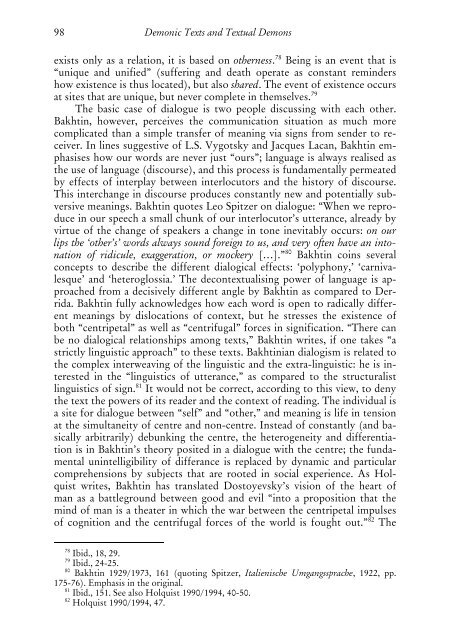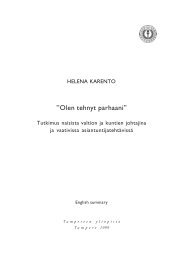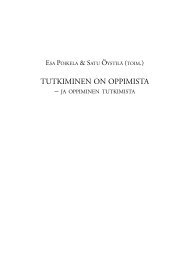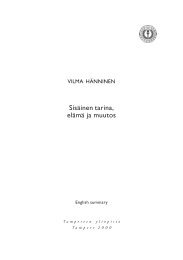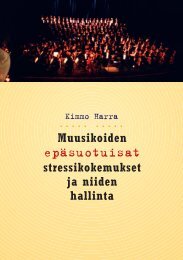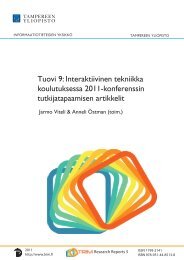Note on this edition: this is an electronic version of the 1999 book ...
Note on this edition: this is an electronic version of the 1999 book ...
Note on this edition: this is an electronic version of the 1999 book ...
Create successful ePaper yourself
Turn your PDF publications into a flip-book with our unique Google optimized e-Paper software.
98Dem<strong>on</strong>ic Texts <strong>an</strong>d Textual Dem<strong>on</strong>sex<strong>is</strong>ts <strong>on</strong>ly as a relati<strong>on</strong>, it <strong>is</strong> based <strong>on</strong> o<strong>the</strong>rness. 78 Being <strong>is</strong> <strong>an</strong> event that <strong>is</strong>“unique <strong>an</strong>d unified” (suffering <strong>an</strong>d death operate as c<strong>on</strong>st<strong>an</strong>t remindershow ex<strong>is</strong>tence <strong>is</strong> thus located), but also shared. The event <strong>of</strong> ex<strong>is</strong>tence occursat sites that are unique, but never complete in <strong>the</strong>mselves. 79The basic case <strong>of</strong> dialogue <strong>is</strong> two people d<strong>is</strong>cussing with each o<strong>the</strong>r.Bakhtin, however, perceives <strong>the</strong> communicati<strong>on</strong> situati<strong>on</strong> as much morecomplicated th<strong>an</strong> a simple tr<strong>an</strong>sfer <strong>of</strong> me<strong>an</strong>ing via signs from sender to receiver.In lines suggestive <strong>of</strong> L.S. Vygotsky <strong>an</strong>d Jacques Lac<strong>an</strong>, Bakhtin emphas<strong>is</strong>eshow our words are never just “ours”; l<strong>an</strong>guage <strong>is</strong> always real<strong>is</strong>ed as<strong>the</strong> use <strong>of</strong> l<strong>an</strong>guage (d<strong>is</strong>course), <strong>an</strong>d <strong>th<strong>is</strong></strong> process <strong>is</strong> fundamentally permeatedby effects <strong>of</strong> interplay between interlocutors <strong>an</strong>d <strong>the</strong> h<strong>is</strong>tory <strong>of</strong> d<strong>is</strong>course.Th<strong>is</strong> interch<strong>an</strong>ge in d<strong>is</strong>course produces c<strong>on</strong>st<strong>an</strong>tly new <strong>an</strong>d potentially subversiveme<strong>an</strong>ings. Bakhtin quotes Leo Spitzer <strong>on</strong> dialogue: “When we reproducein our speech a small chunk <strong>of</strong> our interlocutor’s utter<strong>an</strong>ce, already byvirtue <strong>of</strong> <strong>the</strong> ch<strong>an</strong>ge <strong>of</strong> speakers a ch<strong>an</strong>ge in t<strong>on</strong>e inevitably occurs: <strong>on</strong> ourlips <strong>the</strong> ‘o<strong>the</strong>r’s’ words always sound foreign to us, <strong>an</strong>d very <strong>of</strong>ten have <strong>an</strong> int<strong>on</strong>ati<strong>on</strong><strong>of</strong> ridicule, exaggerati<strong>on</strong>, or mockery […].” 80 Bakhtin coins severalc<strong>on</strong>cepts to describe <strong>the</strong> different dialogical effects: ‘polyph<strong>on</strong>y,’ ‘carnivalesque’<strong>an</strong>d ‘heteroglossia.’ The dec<strong>on</strong>textual<strong>is</strong>ing power <strong>of</strong> l<strong>an</strong>guage <strong>is</strong> approachedfrom a dec<strong>is</strong>ively different <strong>an</strong>gle by Bakhtin as compared to Derrida.Bakhtin fully acknowledges how each word <strong>is</strong> open to radically differentme<strong>an</strong>ings by d<strong>is</strong>locati<strong>on</strong>s <strong>of</strong> c<strong>on</strong>text, but he stresses <strong>the</strong> ex<strong>is</strong>tence <strong>of</strong>both “centripetal” as well as “centrifugal” forces in significati<strong>on</strong>. “There c<strong>an</strong>be no dialogical relati<strong>on</strong>ships am<strong>on</strong>g texts,” Bakhtin writes, if <strong>on</strong>e takes “astrictly lingu<strong>is</strong>tic approach” to <strong>the</strong>se texts. Bakhtini<strong>an</strong> dialog<strong>is</strong>m <strong>is</strong> related to<strong>the</strong> complex interweaving <strong>of</strong> <strong>the</strong> lingu<strong>is</strong>tic <strong>an</strong>d <strong>the</strong> extra-lingu<strong>is</strong>tic: he <strong>is</strong> interestedin <strong>the</strong> “lingu<strong>is</strong>tics <strong>of</strong> utter<strong>an</strong>ce,” as compared to <strong>the</strong> structural<strong>is</strong>tlingu<strong>is</strong>tics <strong>of</strong> sign. 81 It would not be correct, according to <strong>th<strong>is</strong></strong> view, to deny<strong>the</strong> text <strong>the</strong> powers <strong>of</strong> its reader <strong>an</strong>d <strong>the</strong> c<strong>on</strong>text <strong>of</strong> reading. The individual <strong>is</strong>a site for dialogue between “self” <strong>an</strong>d “o<strong>the</strong>r,” <strong>an</strong>d me<strong>an</strong>ing <strong>is</strong> life in tensi<strong>on</strong>at <strong>the</strong> simult<strong>an</strong>eity <strong>of</strong> centre <strong>an</strong>d n<strong>on</strong>-centre. Instead <strong>of</strong> c<strong>on</strong>st<strong>an</strong>tly (<strong>an</strong>d basicallyarbitrarily) debunking <strong>the</strong> centre, <strong>the</strong> heterogeneity <strong>an</strong>d differentiati<strong>on</strong><strong>is</strong> in Bakhtin’s <strong>the</strong>ory posited in a dialogue with <strong>the</strong> centre; <strong>the</strong> fundamentalunintelligibility <strong>of</strong> differ<strong>an</strong>ce <strong>is</strong> replaced by dynamic <strong>an</strong>d particularcomprehensi<strong>on</strong>s by subjects that are rooted in social experience. As Holqu<strong>is</strong>twrites, Bakhtin has tr<strong>an</strong>slated Dostoyevsky’s v<strong>is</strong>i<strong>on</strong> <strong>of</strong> <strong>the</strong> heart <strong>of</strong>m<strong>an</strong> as a battleground between good <strong>an</strong>d evil “into a propositi<strong>on</strong> that <strong>the</strong>mind <strong>of</strong> m<strong>an</strong> <strong>is</strong> a <strong>the</strong>ater in which <strong>the</strong> war between <strong>the</strong> centripetal impulses<strong>of</strong> cogniti<strong>on</strong> <strong>an</strong>d <strong>the</strong> centrifugal forces <strong>of</strong> <strong>the</strong> world <strong>is</strong> fought out.” 82 The78Ibid., 18, 29.79 Ibid., 24-25.80 Bakhtin 1929/1973, 161 (quoting Spitzer, Italien<strong>is</strong>che Umg<strong>an</strong>gssprache, 1922, pp.175-76). Emphas<strong>is</strong> in <strong>the</strong> original.81 Ibid., 151. See also Holqu<strong>is</strong>t 1990/1994, 40-50.82Holqu<strong>is</strong>t 1990/1994, 47.


